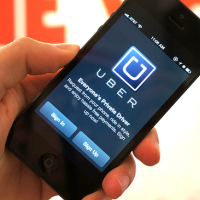Taxi Technology Revolution Stirs Passenger Passion and Driver Revolt in Bay Area

San Francisco officials approved hundreds of new taxi permits this week for drivers working in the city, but this response to longstanding complaints about the dearth of cabbies outside of downtown may pale in comparison to the recent game-changing introduction of Internet app-driven ride-sharing services to the area.
Uber, Lyft and SideCar and startups like them use variations on a common theme: Hailing a cab with a smartphone app is much faster than waiting for a cab service to dispatch someone from its fleet. Uber essentially allows all legitimate cabbies who already have permits on its network of available taxis, while Lyft and SideCar employ the questionable practice of letting any drivers plugged into their networks pick up customers in exchange for a “voluntary donation.”
The result is much faster response times for consumers and tumultuous animosity in the taxi industry.
Alternative ride-sharing services are proliferating across the United States, incurring the wrath of established cab companies and the enmity of local governments trying to fit the popular services into existing regulatory frameworks. Last October, California’s Public Utilities Commission (PUC) fined the companies and slapped them with cease-and-desist orders while it pondered its next step.
Its next step was to drop the fines and the desist orders a few months later as it considers how to regulate rates, insurance, safety, reliability and fairness for the startups while not illegally impairing the application of new technology.
Last month, the Federal Trade Commission (FTC) took issue with new rules proposed by the Colorado Public Utilities Commission that would greatly limit Uber’s ability to compete with existing cab companies, arguing that it would “significantly impair competition” and “hurt customers.”
The San Francisco Metropolitan Transportation Agency (SFMTA), which has been regulating taxis since 2009, approved 120 new taxi permits this week for 2013 and 200 more for 2014, while lowering the price of permit medallions from $300,000 to $250,000. There are 1,700 licensed taxi cabs in San Francisco.
A report (pdf) commissioned by SFMTA on “Managing Tax Supply” had recommended immediately increasing the number of cabs in the city (it did) and provide a citywide dispatch service that emulates the startups’ smartphone strategy (it got started on that last month).
The PUC is expected to offer a tentative decision by July 1 on regulations for the burgeoning industry. So far, the largest advance made appears to be adoption of a nifty acronym to describe the transit interlopers: they are NOETS, as in “new online-enabled transit services.”
–Ken Broder
To Learn More:
Uber to Expand Private Ride-Sharing Service in Major U.S. Cities (by Gerry Shih, Reuters)
Drivers: Uber Is Skimming Our Tips (by Josh Harkinson, Mother Jones)
FTC Staff Says PUC Rule Proposals in Uber Case Could “Harm Consumers” (by Andy Vuong, Denver Post)
Managing Taxi Supply (Hara Associates) (pdf)
- Top Stories
- Controversies
- Where is the Money Going?
- California and the Nation
- Appointments and Resignations
- Unusual News
- Latest News
- California Forbids U.S. Immigration Agents from Pretending to be Police
- California Lawmakers Urged to Strip “Self-Dealing” Tax Board of Its Duties
- Big Oil’s Grip on California
- Santa Cruz Police See Homeland Security Betrayal in Use of Gang Roundup as Cover for Immigration Raid
- Oil Companies Face Deadline to Stop Polluting California Groundwater





